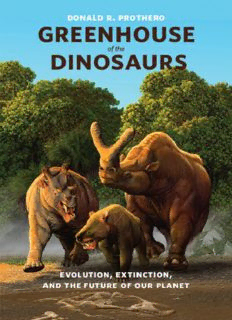
Greenhouse of the Dinosaurs: Evolution, Extinction, and the Future of Our Planet PDF
Preview Greenhouse of the Dinosaurs: Evolution, Extinction, and the Future of Our Planet
DONALD R. PROTHERO Greenhouse of the Dinosaurs EVOLUTION, EXTINCTION, AND THE FUTURE OF OUR PLANET Columbia University Press New York Columbia University Press Publishers Since 1893 New York Chichester, West Sussex cup.columbia.edu Copyright © 2009 Columbia University Press All rights reserved E-ISBN 978-0-231-51832-1 Library of Congress Cataloging-in-Publication Data Prothero, Donald R. Greenhouse of the dinosaurs: evolution, extinction, and the future of our planet / Donald R. Prothero.; illustrated by Carl Buell. p. cm. Includes bibliographical references and index. ISBN 978-0-231-14660-9 (cloth : alk. paper) ISBN 978-0-231-51832-1 (e-book) 1. Dinosaurs— Extinction. 2. Climatic changes—Environmental aspects. 3. Geology—United States. 4. Paleontology—United States. I. Title. QE861.6.E95P76 2009 576.8′4—dc22 2008052555 A Columbia University Press E-book. CUP would be pleased to hear about your reading experience with this e-book at cup- [email protected]. Designed by Lisa Hamm References to Internet Web sites (URLs) were accurate at the time of writing. Neither the author nor Columbia University Press is responsible for URLs that may have expired or changed since the manuscript was prepared. Frontispiece: Dinosaur Cove in the Cretaceous. (Painting by P. Trusler, used with permission) To the memory of two great paleontologists who changed our profession forever: Malcolm Carnegie McKenna (1930–2008) and Stephen Jay Gould (1941–2002) | Contents Preface Acknowledgments 1 | Greenhouse of the Dinosaurs 2 | Bad Lands, Good Fossils 3 | Magnets and Lasers 4 | “Punk Eek” in the Badlands 5 | Death of the Dinosaurs 6 | Marine World 7 | Rocky Mountain Jungles and Eels’ Ears 8 | From Greenhouse to Icehouse 9 | Once and Future Greenhouse? 10 | Kids, Dinosaurs, and the Future of Paleontology Bibliography Index | Preface May you live in interesting times. —old chinese proverb Popular science writing has come a long way since the days of Charles Darwin and Loren Eiseley. Today, the public seems ever more ignorant of science at a time when science literacy is crucial to making public-policy decisions about medicine, the environment, and many other issues. In particular, science is seen as something impersonal and dehumanized, largely due to the scientific tradition of eliminating the observer from the narrative. In scientific publications, the writer must avoid first-person pronouns and use the passive voice, as if the discoveries happened all by themselves, and the human element were unnecessary. As all good scientists know, however, science is very much a human activity, subject to trends and fads. It is influenced by the culture in which it arises. It is not a cold, impersonal search for what is “out there” beyond the human realm. Science is also a very social activity, from the give and take and camaraderie of professional societies and meetings to the strict gauntlet of peer review to the acrimonious debates over hot topics and controversial ideas. Scientists must go through a long, brutal ordeal known as graduate school to earn their degrees that qualify them for admission into their professions and then through an even longer process in which they must “publish or perish” not only to obtain tenure and job security, but to prove their scientific mettle and keep active by discovering new things that other scientists will consider worthwhile. To me, it is as important to inform the public about this aspect of science as it is to publicize our conclusions and discoveries. In recent years, we’ve seen a trend for more and more popular science writing to inject this human element and to tell not only the scientific story, but also the social background behind the discoveries, or the writer’s own narrative of how he or she was involved in the discovery process. As indicated by sales figures, readers of popular and trade science books apparently enjoy and appreciate this approach because it helps to humanize what is often seen to be a cold and impersonal process. This book is my own attempt to inject the human side of the profession into the story of the research topics I have had the great fortune to be involved in over the past 40 years. I started out as a kid who loved dinosaurs, but by graduate school I found myself in the center of debates about mass extinctions, tempo and mode of evolution, the geologic timescale, and the great transition from greenhouse of the dinosaurs to our present icehouse planet. I also benefited from interactions with some extraordinary scientists and had the opportunity to work on amazing scientific problems. I was trained at a time of incredible intellectual ferment and even revolutionary transformation in my field. In that respect, I was very fortunate, and I hope that this tale of these “interesting times” will engage the reader as much as my profession has fascinated me.
Description: